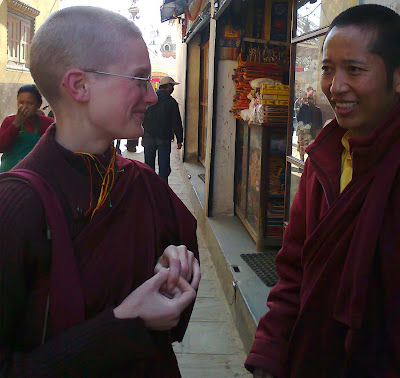Studying Madhyamika
 |
| Ani Sangye and Lopon Chodrup |
In Spring 2012 we continued studying Introduction to the Middle Way and The Jewel Ornament of Liberation, with
our lopons, who are excellent at relating these classic texts to our experience
as modern Buddhists.
Chandrakirti says,
“Of Buddhahood’s abundant crop, compassion is the seed/ It is like moisture, bringing increase and is said/ To ripen in the state of lasting happiness/ Therefore to begin, I celebrate compassion!”
Which really touches on the essence of Madhyamika. What is it that prevents us from being
genuinely compassionate with others? It's
this subtle sense of being separate from situations, other people and other
beings—basically it comes down to our sense of “self-ness,” that the center of
space is right here called “me.” When
we’re suffering from negative emotions, Madhyamika really gets down to the
heart of it.
We are all naturally
compassionate, but there is something preventing that from shining
through—namely, clinging to the two types of self. So when I feel that I’m suffering there is
always some sort of inner argument going on between “me” and some feeling that
I don’t want to experience. Either I
react to that by wanting to be free from it, which is anger, by wanting to have
something else instead, which is attachment, or by just spacing out and
ignoring it, which is ignorance. On that
basis builds all the more complex emotions we experience as humans.
Although Madhyamika texts spend a lot of time
talking about pillars and vases in dialogue with philosophers who are thinking
about these things, Tokpa Tulku was such an excellent teacher because he
taught us to apply it to our own situation.
The self of phenomena and the self of self encompass our entire
experience, so there is no situation in which we can’t use these reasonings to
break down our grasping to emotions and situations as real. This is why we need the three types of
knowledge that arise from learning, reflecting and meditating. The first two train our conceptual mind,
which is quick to learn but not very powerful, so that we can apply this
through meditation to our habitual tendencies, which are slow to learn but very
powerful in dictating our body and speech.
Thanks Tulku, I hope we will all be able to take your advice and continue to apply these teachings to our experience over the summer.
~Ani Sangye from the US



Comments